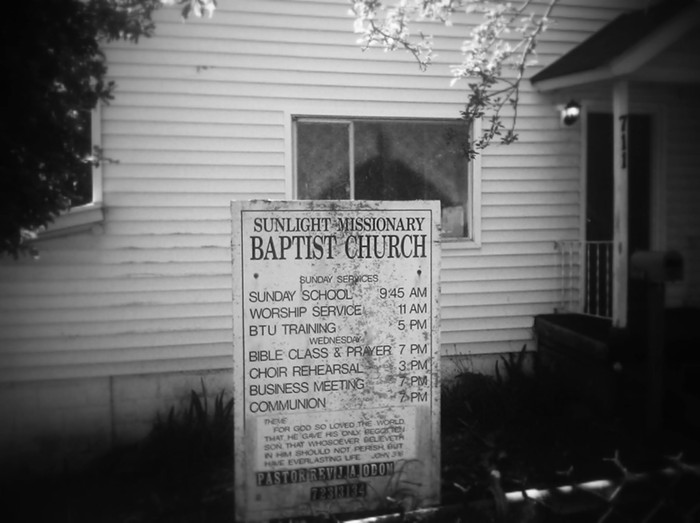
Just months after passing SESTA and FOSTA, a duo of bills that hold internet companies liable for advertising sex work and led to the shuttering of Backpage and other websites where people advertise sex, Congress is back with another bill that threatens to harm consenting adult sex workers. The End Banking for Human Traffickers Act, which passed in the House last month and is now headed for the Senate, would pressure banks to close the accounts of people suspected of human trafficking. What could go ever go wrong with that?
Well, a lot. As the Huffington Post's Jenavieve Hatch pointed out, sex workers, cam girls, porn stars, exotic dancers, and others who vaguely work in the sex industry could lose their access to banks if financial institutions decide to close their accounts in light of this bill. And that is not good: Without access to conventional banks, these workers may be forced to use predatory financial institutions that target low-income people.
From HuffPo:
Sex workers already have trouble finding financial institutions that will accept their money. Banks are often reluctant to discuss their decisions to close accounts and aren’t legally required to explain them. In 2014, JPMorgan Chase closed the bank accounts of several adult film actors without telling them why. And between 2013 and 2017, some sex workers also got caught up in Operation Choke Point — a 2013 initiative by President Barack Obama to discourage banks from working with payday lenders and gun retailers. As part of the initiative, which the Trump administration scrapped last August, industries like pornography and dating services were listed as “high risk” — a designation that pushed banks to shut down accounts tied to those industries.
This bill, which was sponsored by Senators Marco Rubio and Elizabeth Warren, could push an already marginalized population even further underground. "This is a terrible, terrible law," says Mistresse Matisse, a sex worker in Seattle. "Worse in my opinion than even SESTA/FOSTA, and it reflects a hatred towards sex workers that is unfortunately very bipartisan. That Senator Elizabeth Warren, who styles herself as the champion of 'the little people' on economic issues, is co-sponsoring this bill, is reprehensible. Both Warren and Rubio are capitalizing on a baseless moral panic to boost their own careers at our expense.”
Instead of further penalizing sex workers, there are other ways the government could combat human trafficking: Namely, decriminalize sex work itself. In New Zealand, sex work has been decriminalized since 2003, and I recently spoke with Madame Murphy, an American-born brothel owner there. While she would never have gotten involved in the sex trade in the U.S. (it is illegal, after all), in N.Z., Madame Murphy founded The Bach, a feminist escort agency in Whangarei, a small, coastal town on the North Island.
"When I first arrived in New Zealand, I had an idea about writing a book about the country," she told me. "And that's when I discovered that sex work wasn't just legalized but decriminalized, which is actually more progressive. Sex work is in the same basket as selling dishwashers here. You don't have to go on a government registry, you don't have to show anybody a medical certificate, and you have the same rights to privacy as everyone else. Sex work just works." But that doesn't mean it's a free-for-all: Condom use is required, sex workers must be 18 years of age, and human trafficking is illegal.
Madame Murphy’s first experience with sex workers was through interviewing them for her book. What she found was not the American idea of sex workers as poor, drug-addled women with no autonomy over their own bodies. Instead, she found women, mostly students and artists, who were happy, enjoyed their jobs, and, perhaps more importantly, were able to enjoy their lives thanks to the income they earned doing sex work. Soon after, she got in touch with a feminist escort agency in Wellington, and spent two weeks hanging out at there. The sex workers not only had flexible work schedules—instead of being assigned shifts, they worked when they wanted to and could refuse a booking at any time—they were well paid. Minimum wage in New Zealand is $15.75 an hour. These women were make $200 an hour, or about 12 times as much.
"It was just awesome," Murphy said. "I rowed crew in college and the staff room at the brothel was like the women's locker room for the Columbia crew team. The women were confident and smart and had their shit together. They would go to work, earn a good living, and then go off and live their lives. And they were having fun. At that point, I was sold. This was something I wanted to be a part of."
Murphy opened the Bach in January 2017. In addition to running the business, she is primarily there to keep her workers safe. "My job is to filter out the creeps and the misogynists and the drunks," she said. "I’m the hall monitor." Her workers are students, nurses, moms, and other regular folks. "They say things like, 'I've been able to take my family to the dentist for the first time. I can take a day off if I want to. I can take my daughter shopping. I've never done that before.' They feel good about what they are doing." (And, yes, she told me, some, but not all, sex workers do experience physical pleasure through the work. “I have some women who are like, ‘I just come to the Bach a couple nights a week so I can get some dick,’” she says. “‘And if I can make a couple hundred books doing it, great.’”)
Decriminalization, however, doesn’t mean that the stigma against sex work has completely disappeared. "That's the number one problem we have with this business," she says. "There's a lot of people who think sex is dirty and sex workers are dirty. The women are doing great, but, unfortunately, they have to swallow a lot of abuse and criticism should anyone in their lives find out."
There are other problems as well, Murphy says. "I operate by the letter of the law. I am vigilant about condom use, drug use, consent. But no one has ever been by to check that I am. In my opinion, it's best that the government stays out of the business of sex workers because many of these women have very serious privacy concerns, sometimes tied up with personal security concerns. But I kind of wish they would get up more in my face as an escort agency owner. I can handle it."
And, of course, not all brothels are run by feminists. Some are shady, don't enforce the law, and decriminalization hasn't entirely made exploitation go away. But it also hasn't made it worse: A 2008 study conducted by the government found that after decriminalization, the overall number of sex workers did not increase, nor did the rate of human sex-trafficking. What did increase, however, was sex worker rates of satisfaction and the safety of their jobs.
After decriminalization, sex workers in New Zealand are better able to screen their clients. They more likely to report a client if they felt pressured, threatened, or otherwise unsafe. They pay taxes, save money, and they can bank wherever they hell they want. We're a long way from this in United States. Our nation was founded by Puritans, and nearly 250 years later, it is still run by them. But, if Marco Rubio, Elizabeth Warren, and other policy makers actually care about sex workers themselves, it's not shutting down their access to financial services that is going to help to keep them safe. It's decriminalizing their jobs.















